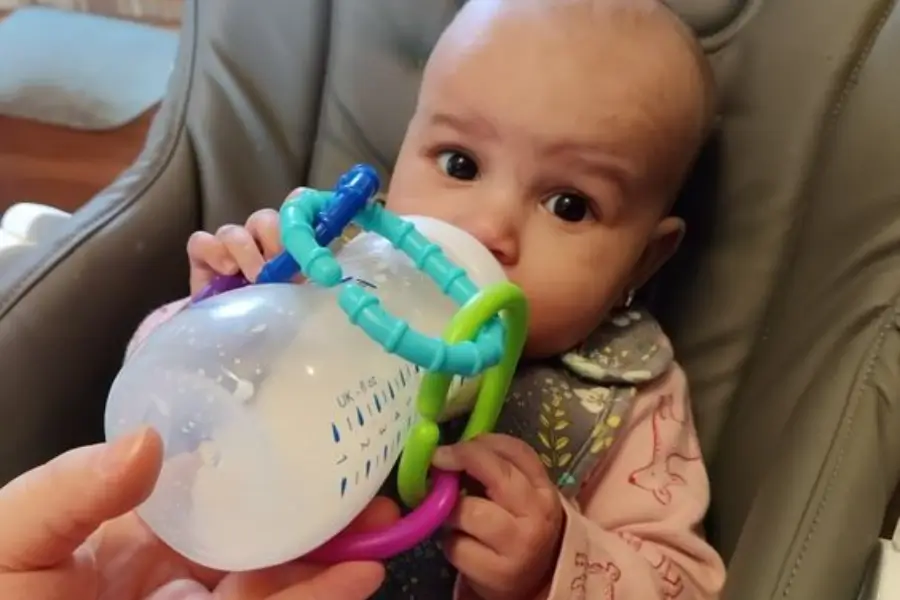
To most parents, self-feeding using a bottle is one of the most significant achievements that their child goes through. It also provides a way to gain some relief from the burden of the care to the parents as well as the freedom to the baby. So, when do babies hold their own bottles?
It’s important to note that each baby’s rate of development is different. Some babies can hold a bottle sooner, while others may need a few more months. This article will provide you with the necessary information to answer that question.
The Average Age For Reaching This Milestone
Changes in a child’s developmental milestones are really important. For example, when babies can hold and hold a bottle on their own, it’s usually around 6 months of age. However, the time can range from 6 to 10 months due to differences in strength and fine motor skills. On average, many babies develop the ability to hold objects when they are 8 or 9 months old.
The factors that influence this milestone mainly come from children’s interest in food. This leads to children switching to bottle feeding1. However, some babies may show less interest in holding a bottle due to loss of appetite. So it can be seen that children who are more eager to eat will grasp it sooner.
The important thing for mothers to note is not to put too much emphasis on whether their child can hold a bottle or not. On the other hand, parents should aim to wean their children when they are about 1 year old. When your baby can hold a bottle of milk, it ensures better nutritional management and development.

When Do Babies Hold Their Own Bottle?
If the child has not yet begun to drink a bottle on his own, there is nothing to worry about, parents should reassure the child. Remember, each child has his or her development, unlike anyone else. Some developmental signs that may indicate your baby is about to hold a bottle or drink from a cup:
Sitting Independence
Parents should create conditions for children to form the habit of sitting on their own, helping them have enough core strength and stability. Parents should practice fine motor skills such as holding a bottle, keeping balance, and walking… Practice children with balanced activities when playing with toys, creating stability for the body. It also shows your baby’s readiness to hold a bottle or cup independently.
Grasping
During sitting it is also possible to develop fine motor skills when combining the development of hands and eyes. Children feeding themselves is a sign of coordination and interest in self-feeding2.
Feeding Cues
At the stage where your baby puts his or her hand on a bottle or cup, it shows that your baby is developing the skills and interest needed to hold the bottle on his or her own.

How Can You Encourage Your Baby To Hold Their Bottle?
Often parents will not know how to help their children hold the bottle, instead try encouraging them in the following ways:
Demonstrating Hand-To-Mouth Motion
Parents can practice self-feeding movements, and hand-eye coordination and use safe baby items such as teething tools. This helps children form reflexes to bring food to their mouths.
Use Easy-Grasp Bottles Or Sippy Cups
They have handles that make it easier for babies to grip them, using these can help babies practice using both hands. This fosters early self-feeding habits.
Guiding Hands-On Approach
Hold your baby’s hand and place it on the bottle to help your baby learn how to hold the bottle. Then, aim the bottle at your baby’s mouth with your hand on top. This helps your baby get used to movement and the feeling of self-feeding. This technique provides a gentle and supportive way to build confidence and motor skills.
Building Strength Through Tummy Time
Tummy time plays a vital role in strengthening a baby’s neck and shoulder muscles, preparing them for milestones like rolling over, sitting up, and crawling. Strong core muscles support overall physical development.
Encouraging Upright Feeding
It requires the baby to sit on their own before self-feeding to be safe and effective. Upright feeding positions help prevent choking and support better digestion.
Parents should focus on teaching children to drink from a cup in parallel with controlling bottle feeding. This method will support essential self-feeding skills, so your child is not overly dependent on the bottle. This is consistent with weaning children from bottles when they are about 1 year old.

Important Precautions To Consider When Allowing Your Baby To Take Control Of The Bottle
It is not always possible for a baby to hold a bottle and suckle safely, so there needs to be precautions put in place for parents:
Purpose Of The Bottle
Bottles should only be used for feeding, not for baby’s comfort or sleep. Parents who allow their children to use a bottle as a comforter can lead to unhealthy habits and potential health problems. For example, unsupervised bottle feeding can lead to prolonged exposure to milk, which can cause tooth decay due to the sugar in the milk.
Avoiding Bottles In The Crib
When a baby drinks a bottle in the crib, it poses significant risks, because the milk will accumulate around the teeth, which over time can lead to tooth decay. In the short term, there is also a risk of suffocation. In addition, maintaining this habit will affect the child’s sleep because the child depends too much on the bottle. The advice given here is to feed your baby before going to bed and then clean their teeth and gums. It helps keep their mouth clean and reduces the risk of tooth decay.
Supervised Feeding
Proposing the bottle can increase the risk of choking and overfeeding because the baby cannot control the flow of milk. In addition, children drinking milk while lying down can cause ear infections because the milk enters the eustachian tube. Therefore, parents should supervise and ensure that children bottle-feed properly and drink only the right amount
These precautions demonstrate the importance of careful and supervised feeding, which helps keep babies safe and promotes natural health. Encouraging safe eating habits from an early age helps prevent health problems.

Does The Baby Have To Hold Their Bottle?
No, the baby does not need to hold the bottle. It’s important to note that the absence of this milestone in some babies, especially breastfed babies, is not a cause for concern. This action shows the ability to “cross the midline”3, a key motor skill. In it, a baby reaches from one side of their body to the other with a hand or foot. Here are some of the key points:
- When your baby holds a bottle on his or her own, he or she will practice hand-eye coordination, and over time this skill will be the foundation for the more complex motor tasks they will encounter later.
- Babies may not show “midline crossing” while holding bottles. This is particularly true for breastfed babies. However, this does not indicate a lack of ability. Breastfed babies often transition directly to drinking from a cup around the age of 1, which also requires and reinforces this skill.
- Each child’s development is different. Crossing the midline can also be seen in other everyday activities. For example, using the strong hand to pick up an item on the weak side or bringing a toy to the mouth needs similar skill.
- Each child’s motor skills develop non-linearly. The lack of bottle retention does not mean development is delayed. This is true if the baby demonstrates the same skills through other activities.

The Takeaway
As your baby grows, you will cherish feeding time. However, it’s important to foster self-feeding skills as your child nears one year old. Eating alone is more important than holding the bottle, especially when bottle feeding becomes less frequent. If your baby starts feeding himself from a bottle at 6 to 10 months, it’s an important milestone.
However, if by age 1, your child shows no signs of crossing the midline, consult a pediatrician. They can provide guidance and address any concerns to support your child’s development.
Sources
- Centers for Disease Control and Prevention. (no date) Available at: https://www.cdc.gov/nutrition/infantandtoddlernutrition/bottle-feeding/index.html (Accessed: 04 July 2024). ↩︎
- Collins English Dictionary. (no date) Available at: https://www.collinsdictionary.com/us/dictionary/english/self-feeding (Accessed: 04 July 2024). ↩︎
- Shalaby, M. S., Kuti, K., & Walker, G. (2013b). Intestinal malrotation and volvulus in infants and children. BMJ, 347(nov 26 2), f6949. https://doi.org/10.1136/bmj.f6949 ↩︎






